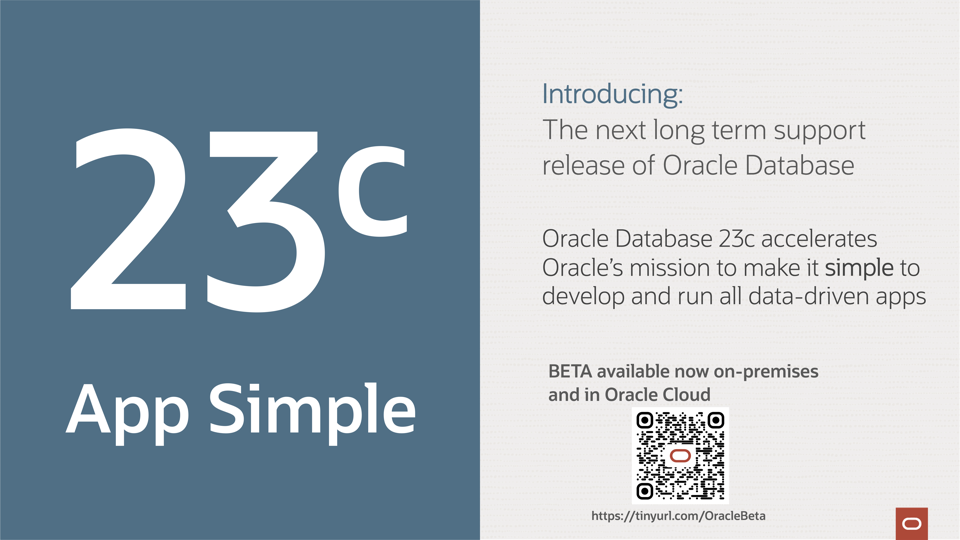And we’re off and running!!! 2022 is done and dusted and a bright and hopefully shining new year is upon us! COVID-19 is still a daily challenge for many, but overall, the world is more and more taking these challenges in stride and continuing to adjust to, and form the “new normal”. As always technology played an outsized role in all our lives – mostly for good and sometimes for ill – all the while the Exadata development team continued to enable our customers and technology partners to deliver on their data management requirements and objectives.
But before we rush headlong into 2023, let’s take a few minutes to look back and reflect on the year that was for Exadata X9M Database Machine, Exadata Cloud@Customer, and ZDLRA.
As always, the Exadata Developement Team has had multiple focuses. Ensure customers reap the benefits of investing in Oracle Engineered Systems by delivering monthly software releases in line with Oracle’s longstanding commitment to data and information security. And continue to innovate and shape the future of data management platforms on-premises and in the cloud.
In May 2022, Exadata System Software 22.1 was released, unleashing streaming performance metrics to Database and Storage Servers alike. Enabling Real-Time Insight into the Exadata platform enables customers to be more nimble in identifying performance outliers and to respond accordingly. Also included were optimizations to our update processes – fine-tuning or parallelizing operations and pre-staging firmware to reduce the overall elapsed time for updates. As I mentioned above, Oracle’s commitment to security is paramount and customers with OVM virtualized machines benefited from a move to OL7 and UEK5 for Dom0.
It seems like every year is a “big” year in the cloud – and 2022 was absolutely no different. We could spend hours covering everything, but let me focus on a few key announcements.
In April, Oracle Exadata X9M debuted in Oracle Cloud Infrastructure – completing the rollout of the X9M generation across all deployment offerings. Exadata X9M in OCI brings with it all the benefits of Exadata and supports both Exadata Database and Autonomous Database deployments. Offering up to 4032 Database CPU cores, 44TB Memory, 1.6PB of Flash Cache, and 3.1PB of usable storage capacity, Oracle Exadata Service X9M delivers on the promise “no workload or database is too large to run”.
Multiple-VM Support for both Autonomous Database on Exadata Cloud@Customer and Autonomous Database on Dedicated Exadata Infrastructure was released. Hopefully, it doesn’t come as a surprise that Oracle’s Autonomous Database runs on Oracle Exadata infrastructure – but if it does, know that if you want to deploy multiple isolated Autonomous Database VMs on the same Exadata Cloud infrastructure, this is now a reality!
Speaking of Virtual Machines on Exadata, customers deploying Exadata Database Service on Dedicated Infrastructure are now also able to create multiple VM clusters within the infrastructure, and if required, to specify which database server nodes the VMs will be resident on – rather than uniformly spreading the cluster across all available nodes. You can read more on Multiple VM support and VM Cluster Subsetting on ExaDB-D in Prince Mathew’s announcement.
Oracle CloudWorld (OCW) 2022 made its debut in October in Las Vegas, and I have to echo the multitude of other bloggers out there when I say it was good to finally meet customers (and many colleagues) face to face again! But OCW isn’t solely about social interactions – some very exciting announcements were also made. In particular, Larry Ellison reiterated in his keynote Oracle’s commitment to bringing the best database and the best database platform to customers not using Oracle Cloud Infrastructure. Released in July, Oracle Database Service for Azure enables Microsoft Azure customers to connect to and utilize Oracle Autonomous Database, Exadata Database Services, Oracle Base Database Service (VMs), and MySQL Heatwave as if they were in Azure.
The Oracle Database Zero Data Loss Autonomous Recovery Service (ZRCV) and Full Stack Disaster Recovery Service (Full Stack DR) were also announced during Oracle CloudWorld. Zero Data Loss Autonomous Recovery Service brings the Zero Data Loss Recovery Appliance to OCI significantly reducing backup and recovery management complexity, and improving data resiliency and protection. Full Stack DR greatly simplifies and manages the transition of infrastructure, platforms, and applications between OCI regions including using Oracle Data Guard to failover between Oracle Database and Oracle Exadata Cloud infrastructure. Two more enterprise-grade services making the adoption of Oracle Cloud even easier!

While we’re on the topic of data protection, the Oracle Zero Data Loss Recovery Appliance and Oracle Database Zero Data Loss Autonomous Recovery Service include significant capabilities to help organizations protect themselves from ransomware attacks. Of particular importance are Database Transaction-level cyber protection, End-to-end Recovery Validation, and Immutable Backups! I thoroughly recommend you take a look at these capabilities to ensure you are protecting your backups, as well as your databases.
Oracle Database 23c Beta was also unleashed at Oracle CloudWorld. Database 23c will be the next long-term support release of Oracle Database and with over 300 new features, application development is about to get even simpler. Features such as JSON Relational Duality, Real-time SQL Plan Management, True Cache, real-time property graph analysis of operational data, and many more – now is the time to join the Beta program!
Oracle CloudWorld is heading back to Las Vegas from the 18th to the 21st of September 2023. 2023 is shaping up to be a huge year – hopefully, we’ll see you in Las Vegas to dive deep into all the innovations we’re working on!
As I regularly do at this time of year, I’d like to thank the Exadata development group – these dedicated individuals consistently prove that the whole is greater than the sum of the parts. Each brings their own perspective, knowledge, and experience and Oracle Exadata is the greater for the robust and collaborative approach taken in its development. To the Sustaining Engineering and Support teams – I thank and include you in the previous statement – releasing an innovative platform is only the first step in customer success. You keep these incredible machines and more importantly our customers delivering on their missions. Thanks also go to our sales, marketing, service, and back-office teams that help our customers achieve incredible results.
Finally, to our customers and partners – a massive Thank You for proving day after day that Exadata is the premier platform to run Oracle Database!
On behalf of my fellow Product Managers and the Exadata Development organization, I hope you had a happy and safe holiday season and look forward to bringing you more innovative services and updates throughout 2023!


